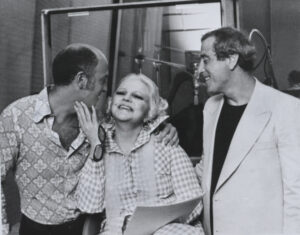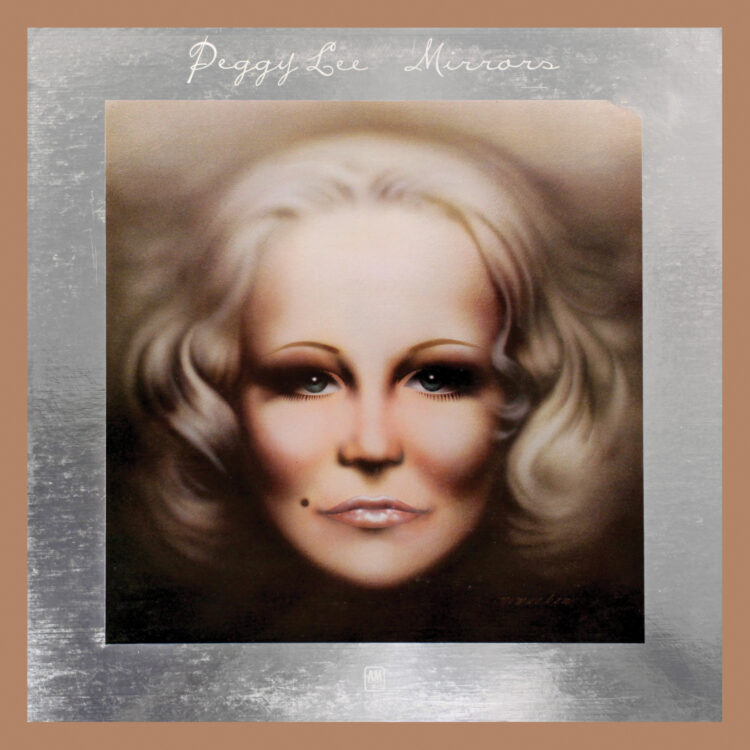LOS ANGELES, CA , October 17, 2025 – In celebration of its 50th anniversary, Universal Music Enterprises (UMe), in collaboration with Peggy Lee Associates and Leiber/Stoller Productions, announces today’s release of an expanded digital edition of Peggy Lee’s cult masterpiece Mirrors.
Available at all digital service providers, the newly remastered expanded edition adds seven bonus tracks to the original album’s 10-song tracklist. Featuring five previously unreleased tracks, the new 17-track edition now features Peggy Lee’s entire A&M Records song catalog.
Conceived by the legendary songwriting and producing team of Jerry Leiber and Mike Stoller, Mirrors presents a series of dramatic vignettes and character studies, all of them vividly brought to life by the combined superpower of Peggy Lee’s superb interpretations and Johnny Mandel’s sumptuous arrangements.
The original ten tracks range in tone from sensual and humorous — “Some Cats Know,” “I’ve Got Them Feelin’ Too Good Today Blues” — to ominous and eerie — “Tango,” “The Case of M.J.” Love and longing, memory and mimesis, self-deception and self-reflection are among the all-too-human themes most prominently showcased throughout. A meditative, mellow mood is conjured by the more somber songs, while the more upbeat tunes burst with playful exuberance. Of Mirrors, Peggy Lee noted that it “reflects on people — their experience, memories, happiness, sadness — and takes you on a cruise: a voyage of the mind.”

The bonus tracks offer a rich potpourri of musical genres, running the gamut from R&B — “Daddy What I Do (The Climb),” “I Ain’t Here” — to shout-style gospel and smooth jazz — “Saved,” “The Best Thing.” Each of these tracks was gamely tackled by the team of Lee, Leiber and Stoller while they were exploring the option of crafting a more mainstream album before they fully settled into making the conceptual Mirrors.
Among the exploratory sessions was Peggy Lee’s interpretation of “Love Me or Leave Me,” a standard she first recorded for her acclaimed 1953 album Black Coffee. Perennially committed to proving that the American songbook shall forever stand the test of new musical trends, she requested the recasting of this old familiar tune (1928) to the effervescent disco beat which, at the time, was just beginning to take hold over the American radio airwaves.
Bold, genre-blurring, and well ahead of its time, Mirrors did not enjoy a roundly auspicious reception in the 1970s, but over ensuing decades it has gone on to become a cult favorite and a critic’s choice. This century’s accolades have included raves from industry insiders such as Jazz Bakery’s president and artistic director Ruth Price (2014), and from publications like the well-respected UK magazine Mojo. The editors of that long-running rock and jazz magazine bestowed their ultimate seal of approval of Mirrors when they granted the album its own entry on their Mojo Collection: The Greatest Albums of All Time (2001).
Further confirmation of the album’s reverential standing comes from Mike Stoller himself, who on some of his more recent travels around the globe discovered that “certain cults had formed around Mirrors. In many countries I visited, I was known as half of the Leiber and Stoller team celebrated not for the Robins or the Coasters or the Drifters, nor for Big Mama Thornton or Elvis or Ben E. King, but for having coauthored Peggy Lee’s Mirrors. That acknowledgement meant a lot to me.” Updated liner notes by Peter Stoller are available at PeggyLee.com.
Originally released October 17, 1975, Mirrors earned a Grammy® nomination for Best Album Package in 1976.
Track Listing
1. Ready to Begin Again
2. Some Cats Know
3. I’ve Got Them Feelin’ Too Good Today Blues
4. A Little White Ship
5. Tango
6. Professor Hauptmann’s Performing Dogs
7. The Case of M.J.
8. I Remember
9. Say It
10. Longings for a Simpler Time
Bonus Tracks
11. I Ain’t Here***
12. The Best Thing*
13. Love Me or Leave Me*
14. Crazy Life*
15. Daddy, What I Do (The Climb)**
16. Saved*
17. Don Juan***
*previously unreleased
**previously unreleased rough mix
***previously available only on Peggy Lee Sings Leiber & Stoller (2005)
All songs written by Jerry Leiber and Mike Stoller, except for track #13 written by Walter Donaldson, Gus Kahn and track #14 written by Gino Vannelli. Track #12 was co-written by Jerry Leiber, Mike Stoller, Ralph Dino, and John Sembello.
____________________
Words by Jerry Leiber • Music by Mike Stoller

Notes by Peter Stoller
Ready to Begin Again (Manya’s Song)
“Ready to Begin Again (Manya’s Song),” inspired by Jerry Leiber’s mother, Manya, was composed as an audition for a musical version of Jean Giraudoux’s play The Madwoman of Chaillot. For the Mirrors recording, Leiber and Stoller enlisted Perry Botkin, Jr., as an arranger. They had known him since the early ’50s, when, as Bunny Botkin, he’d written vocal arrangements for the Cheers.
Lee’s interpretation allows her character to navigate the daily humiliations of aging in a youth-centric world — something she’d just begun to experience in her mid-50s — with an unexpected and moving dignity. It’s also a virtual answer record to “Is That All There Is?”
Some Cats Know
“Some Cats Know” was written for a proposed musical adaptation of Robert Gover’s scandalous novel One Hundred Dollar Misunderstanding. Not originally conceived as a cabaret number, this recording fit into the Mirrors album with a little overdubbed “sweetening” in the form of Meco Monardo’s sublime strings and George Young’s slippery flute. It’s all anchored by the outstanding bass playing of the legendary Ray Brown.
The initial impulse for the lyric came from the punch line of a Slappy White routine — “if a cat don’t know, a cat don’t know” — for which Leiber then wrote a better joke.
I’ve Got Them Feelin’ Too Good Today Blues
As a number for the fictional rock group at the center of the caper movie parody The Phynx (a perennial contender for the worst film ever made), “I’ve Got Them Feelin’ Too Good Today Blues” was pure vaudevillian pastiche. Here, the song is rehabilitated by Johnny Mandel’s snappy ragtime-meets-potted palms arrangement and Lee’s witty, swinging reading; you can practically hear them winking at each other. Stoller called this “as simple and straightforward a song of joy as Jerry Leiber is capable of writing.”
A Little White Ship
In the early 1950s, while studying composition with Arthur Lange, Stoller composed “Suite Allegro” for violin, cello, clarinet, and bassoon. Leiber loved the music, and eventually he and Stoller adapted some of its themes into songs.
Leiber had met with Tennessee Williams to discuss transforming Williams’ play Camino Real into a musical. “A Little White Ship” was conceived for the character of A. Ratt, proprietor of the Ritz Men Only hotel — which, as Lee makes clear, was not exactly the Holiday Inn.
Tango
While Leiber and Stoller worked on The Phynx, the romantic silent film icon Ramón Navarro was murdered in his apartment by rough trade. Leiber was moved to write the lyric of “Tango” as an homage to him. The music deftly conjures old Hollywood by way of Astor Piazzola, to whose music Stoller had recently been introduced.
Lee’s stirring rendition of the recitative is reminiscent of her spoken verses in “Is That All There Is?”
Professor Hauptmann’s Performing Dogs
A treatise on the dehumanizing mechanisms of fascism in contemporary America, this melding of the circus-cum-military march music of John Philip Sousa (an irony in itself) with the “degenerate music” of 1930s Berlin remains all too timely, as does Lee’s fury.
The Case of M. J.
Based on another theme from “Suite Allegro,” the eerily sparse “The Case of M. J.” was loosely inspired by Truman Capote’s seminal short story, “Miriam,” reimagined through the lens of psychoanalysis.
The constant repetition of the phrase “How old were you when your father went away?” on the original album never satisfied Leiber and Stoller; the current mix reflects their true intention.
I Remember
In early 1975, Leiber came to Stoller with a lyric and said, “I’ve got an assignment for you that you’re not going to like.” “What makes you think,” Stoller responded, “that I’ve liked any of the other ones?” He nonetheless rose to the occasion. “I Remember” was inspired by Haiku poetry; although it does not adhere to its form, it captures Haiku’s spare elegance. Lee’s remarkable performance does the same.
Say It
Like “Ready to Begin Again,” “Say It” was written for The Madwoman of Chaillot, as “mad” Countess Aurelia’s plea to the young Pierre, with whom the songwriters imagined she would have an affair. Leiber considered it perhaps the best love song he’d ever written. “Say It” was Lee’s favorite song on Mirrors, and the one she kept in her set the longest.
Longings for a Simpler Time
“Longings for a Simpler Time,” written for a musicalization of Jeff Weiss’ Obie award-winning play The International Wrestling Match, is perhaps the truest song about nostalgia ever written. As with the seven songs preceding it, Johnny Mandel’s genius as an arranger is on full and glorious display.
*
For lack of a better term, we’ve called the bonus tracks on this 50th anniversary release “demos.” They both are and aren’t. Leiber, Stoller, and Lee wanted to make the album they eventually made, but because winning A&M’s approval was a long shot, they prepared a Plan B, or perhaps Plans B and C. One possible alternative was to cut an album of R&B-flavored Leiber-Stoller songs written, and in some cases recorded, in the early 1960s: “Saved,” “Don Juan,” “I Ain’t Here,” “The Climb,” “Some Cats Know.” The other was to record more contemporary songs, or classics in a contemporary pop style: “Crazy Life,” “The Best Thing,” “Love Me or Leave Me.”
Those delineations weren’t meant to be precise; if anything, keeping it loose served the notion of a backup plan. The productions were likewise loose — more so than was either Leiber and Stoller or Lee’s style. None of the “bonus” recordings was considered finished: for proper release, they awaited overdubs, additional takes, possibly new arrangements. So, they might have been incomplete masters, or just food for thought. Ultimately, it didn’t matter: Once A&M president Gil Friesen gave Mirrors the green light, the Plan B tracks were abandoned without a second thought, save for lucky “Some Cats Know.”
Or, rather, penultimately, since the release of Peggy Lee Sings Leiber and Stoller in 2005 and this album in 2025 called for completing the incomplete. We decided against adding new overdubs, which would have simplified some things but complicated others. Instead, we patched things up with spit and glue, with the exception of “Daddy What I Do (The Climb),” for which we couldn’t locate the multitracks. Comparing that to the other recordings is nothing if not instructive.
We still call them “unfinished,” since that’s what they were. But we’re finished with them now. All that’s left is for you to enjoy them.
I Ain’t Here (Leiber, Stoller)
“I Ain’t Here,” another piece from The International Wrestling Match, was conceived to be performed by a black maid ironing clothes, with a defiantly inverted take on her invisibility in the world of her white employer. Despite having been omitted from Mirrors, Lee’s reading of this song became one of Leiber and Stoller’s personal favorite from the recording sessions when it was mixed for Peggy Lee Sings Leiber and Stoller.
The Best Thing (Dino, Sembello, Leiber, Stoller)
Although the eponymous A&M album that Leiber and Stoller cowrote and produced for Dino and Sembello generated no hits for the duo, some songs took on a life with other artists: “Pearl’s a Singer” put Elkie Brooks in the UK top ten for the first time, while “The Best Thing” put Billy Eckstine on the US R&B charts for the last. Had the winds blown a different way, what worked for Eckstine could just as well have worked for Lee.
Love Me or Leave Me (Donaldson, Kahn)
Peggy Lee was eight years old when Ruth Etting debuted “Love Me or Leave Me” on Broadway in the hit musical, Whoopee! Lee put her own distinctive stamp on it 25 years later for her Black Coffee album. 20-odd years after that, Lee, Leiber, and Stoller dusted it off yet again, and tossed on some period glitter.
Crazy Life (Vannelli)
Leiber and Stoller plucked the title track from A&M stablemate Gino Vannelli’s debut album — which hadn’t fared much better in the marketplace than Dino & Sembello — for Lee. (Vannelli would hit paydirt soon enough.) Vannelli didn’t release “Crazy Life” as a single; in the alternate universe where A&M decided against the Mirrors concept, it might have been the lead-off single for Lee. Like “The Best Thing,” it showcases Lee’s way with a jazzy romantic pop ballad.
Daddy, What I Do (The Climb) (Leiber, Stoller)
A parody of dance craze anthems like “The Twist” and “The Locomotion,” the song’s original title as recorded by the Coasters was “The Slime.” Atlantic Records was quick to nix that, so they went back to the studio and recut it as “The Climb.” It did nothing in the US, but became an improbable hit in France, where French artists quickly recorded no fewer than eight cover versions, apparently mistaking it for a real dance craze. In the final chorus of the original release, the Coasters replace the word “climb” with the phrase, “squatty-watty.” That mutated into “Daddy, what I do” in the Plan B sessions. It’s a contender for the weirdest recording in Peggy Lee’s long, varied career.
Saved (Leiber, Stoller)
Leiber and Stoller had toyed with gospel early in their career on their short-lived but influential label, Spark Records, with vocal quintet the Honey Bears. But they didn’t really give gospel the Leiber-Stoller treatment until “Saved,” with which LaVern Baker walked the line between homage and parody all the way up to the Top 40 in 1961. Peggy Lee, meanwhile, had played around the secular edges of the genre with such songs as “Hallelujah, I Love Him So” and “Brother Love’s Traveling Salvation Show.” So, the notion of Lee recording “Saved” wasn’t as big a stretch as it might first appear. The real synergy, though, was on the flip side.
Don Juan (Leiber, Stoller)
“Don Juan,” in its first incarnation, was a hurriedly half-written B-side for “Saved.” Audiences were introduced to the completed song via Leiber and Stoller’s musical revue Smokey Joe’s Café, but Peggy Lee’s is the first recording of it, albeit unreleased until 2005. Lee’s rendition wisely doesn’t attempt to plumb the depths of the subtext — a commentary on the politics of race and class — opting instead to wring every drop of wit from the text about a gold-digger whose vein has tapped out.
*
It was a joy to mix Mirrors and select outtakes with Brian Blackburn back in 2005, and a joy again to mix the remaining demos with Mitch Zelezny in 2025. If there’s another scrap of tape from the cutting room floor, I haven’t heard it (and in another 20 years, I’ll be lucky if I can hear anything). So, all that’s left is to once again express my love for my mixing engineers and the original tracking engineers; for the arrangers and musicians; for all those at Universal who made this technically, fiscally, and logistically possible; for Peg’s granddaughter, the delightful and formidable Holly Foster Wells; for the incredible songs; and of course, for Jerry, Mike, and her highness, Miss Peggy Lee.
— Peter Stoller, October 2025

